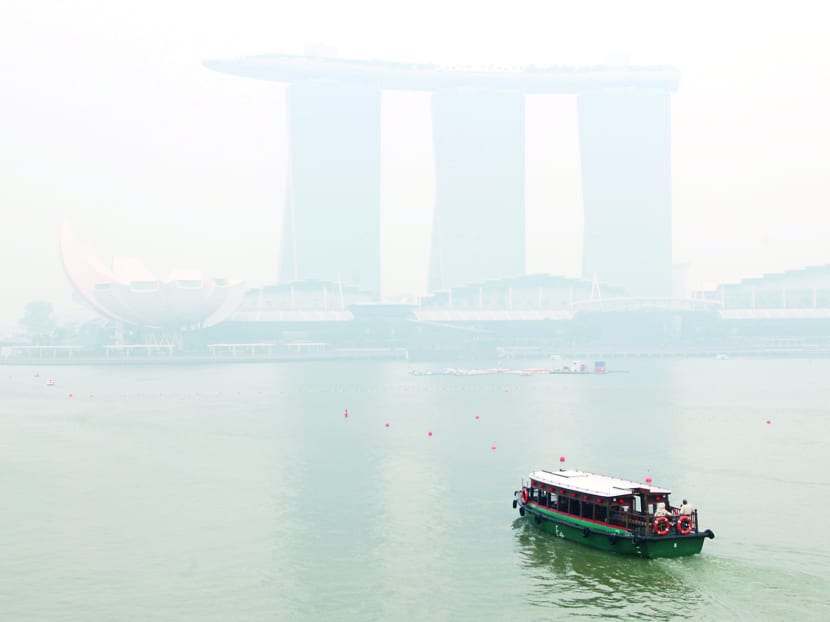Government proposes law to allow action against firms causing haze
SINGAPORE — In a move aimed at sending “a strong signal of deterrence” to errant companies, the Ministry of Environment and Water Resources plans to introduce a law that will allow legal action to be taken against companies, both local and foreign, that cause transboundary haze.
SINGAPORE — In a move aimed at sending “a strong signal of deterrence” to errant companies, the Ministry of Environment and Water Resources plans to introduce a law that will allow legal action to be taken against companies, both local and foreign, that cause transboundary haze.
Under the draft Transboundary Haze Pollution Bill, errant companies can be fined up to S$300,000 if their activities outside Singapore result in the island being blanketed by unhealthy levels of haze. The draft Bill is up for public consultation until March 19.
TODAY understands that the only way for the Government to take action against errant companies that do not have any presence here is when any of their representatives holding management positions set foot on Singapore soil.
Environmentalists and observers TODAY spoke to lauded the proposed legislation as “a great first step” towards tackling the haze menace, but some pointed out that identifying errant companies and taking them to court could be a challenge, and that the proposed maximum fine was too low.
Besides criminal liability, the proposed law will also allow the National Environment Agency (NEA) to ask relevant parties to reduce or control the haze pollution, such as putting out fires or adopting zero-burning practices. If they deliberately ignore such requests, they can be fined up to S$450,000.
Singaporeans affected by the haze can also sue these errant companies for personal injuries, damage to their properties or any other losses due to the haze.
Plans to table the Bill were revealed last year by Environment and Water Resources Minister Vivian Balakrishnan following Singapore’s worst haze episode in June. The three-hour Pollutant Standards Index (PSI) had then hit an unprecedented high of 401, beyond the hazardous level of 300.
Dr Balakrishnan had said that he hoped to have the Bill passed within the first half of this year. In a Facebook post yesterday evening, he noted that transboundary haze had recurred “for too many years” in the region.
“The root cause (of transboundary haze) is commercial ... Errant companies have been clearing land by illegal burning because it is the cheapest way to do so. Although there are domestic laws against this practice, there are real problems in investigation and enforcement in those countries,” Dr Balakrishnan said.
“We hope this legislation will send a strong signal of deterrence to such errant companies.”
Singapore Institute of International Affairs Chairman Simon Tay said the proposed law will allow individual lawsuits against companies, hence bypassing any “friction” that might occur if the matter has to go through governments. With companies having to prove that they are not liable for the haze, they “will feel more pressure to be transparent and responsible”, he added.
A chain reaction might also follow, such as banks becoming more careful when approving loans to companies since the financial institutions would not want to expose themselves to more risks of civil or criminal liability, Dr Tay said.
The proposed law “isn’t a silver bullet, but … it could play a role in creating the overall ecology, for the right kind of approach to this”, Dr Tay added.
Lauding Singapore’s move as “an important step ahead”, Mr Bustar Maitar, head of the Indonesia Forest Campaign of environment group Greenpeace, said: “It also provides an interesting test case to explore the effective legal reach of this proposal.”
In an email reply from Jakarta, Mr Bustar said that while Singapore is leading the way with the proposed law, this must be “equally matched by equally strong measures from the Indonesian government”.
Singapore Environment Council’s Executive Director Jose Raymond felt heavy fines would be an effective deterrence but questioned if the proposed fine is high enough.
Nominated Member of Parliament Faizah Jamal also felt the proposed fines were “paltry”, and suggested that errant companies be ordered to carry out reforestation and compensate victims of the haze, or even prohibited to do business in Singapore instead.
She also felt it would be difficult to take foreign companies to task and questioned whether the NEA would be able to work with their foreign counterparts on enforcement.
Since last year’s haze episode, many firms have found themselves in the spotlight, with Singapore-listed companies, such as a palm oil trader Wilmar, and pulp and paper maker APRIL, emphasising that they have zero-burning policies.
A spokesperson for First Resources, a Singapore-listed palm oil company, said it will support any move to hold those directly responsible for contributing to the haze. ADDITIONAL REPORTING BY NEO CHAI CHIN







